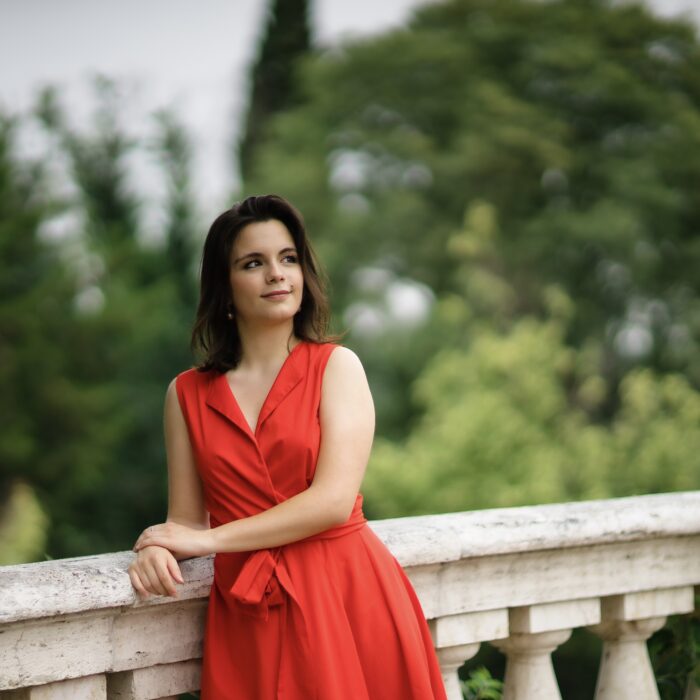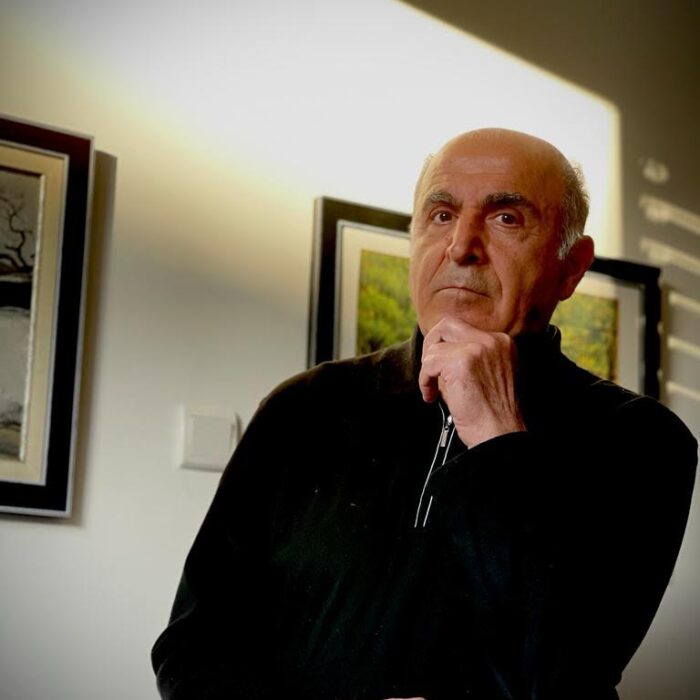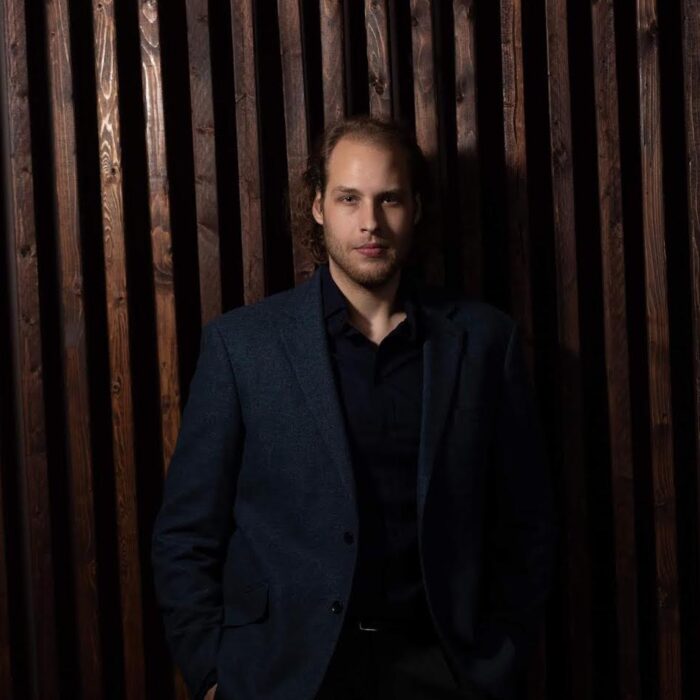
Q & A: Tenor Matthäus Schmidlechner on ‘Elektra’ At Salzburg & Managing the Challenges of Performance & Preparation in the Time of COVID
By Ona JarmalavičiūtėBorn and raised in Salzburg, tenor Matthäus Schmidlechner was brought to Linz by his career. While he works as an ensemble member of the state opera theater of Linz, each year he also makes appearances in his birth town, performing on stage of Salzburg Festival.
In 2018 and 2019 he performed the role of the first Jew in R. Castellucci’s internationally acclaimed production of “Salome.” For the 100th festival this year, he was invited back to perform in K. Warlikowski’s staging of R. Strauss’ “Elektra.”
In an interview with OperaWire, Austrian tenor Matthäus Schmidlechner discussed his career in Linz, the safety system developed for the festival, and the return of live opera after quarantine.
OperaWire: How is it for you to be in the 100th anniversary of the Salzburg festival?
Matthäus Schmidlechner: It feels like a new start after months of doing nothing. I am proud to be here for such an occasion and to perform, even if it is a small part. In the beginning, I was really worried about the pandemic and I thought the organizers of the festival should cancel it—as all other theaters and summer music festivals had done. But then, I figured that sooner or later we will have to start working again.
The start has to be made eventually. It is a strong statement for a very big and visible festival to do this. It does feel like the beginning of something new and I hope that this successful period will extend into autumn and next season.
OW: How was it for you in quarantine, not knowing whether the festival would take place or not?
MS: For all of February I was in Milan rehearsing “Salome” for La Scala. I can say now that I sang once at La Scala, but it was only during a single-stage rehearsal because the opera did not take place and the whole production was canceled. During quarantine, I really had nothing to do, but I was still in a very good position, having a contract with Linz Opera Theater and being able to live without severe financial problems. I was thinking that “Elektra” could be the one opera that makes it to the stage this year because it is relatively short and needs only a small choir.
I was happy it worked out and I could get back to work after the lockdown. I desperately wanted to work. It didn’t matter to me whether the staging was good or not, the kind of character I would get, whether I agreed with the ideas of the director. The Salzburg Festival answered my prayers. The staging was brilliant and I got to work with fantastic colleagues.
OW: Two years ago you were Aegisth in a production of “Elektra” in Linz. How do the two stagings you’ve done of “Elektra” differ?
TS: The previous production helped me understand the opera better and this understanding was deepened further this year while working with K. Warlikowski in Salzburg. Previously I had only one idea in my imagination of how the production could be. Now I realize that there are many possible approaches to the same story and unlimited potential for interpretation.
OW: You have a short role. What are the main challenges of it?
TS: I sing on stage for around 30 seconds. The challenge is to come on stage and be immediately ready—there is no time to warm up. I use some singing techniques to center my voice deep in the belly and get sufficient energy before I go on stage.
I used to make singing mistakes when I wouldn’t prepare enough off-stage for small roles. That taught me a lesson to prepare all the time. In “Elektra,” engaging with other people on stage helps me achieve my energy—making contact with other characters like Chrysothemis, Elektra and, of course, the old servant in the scene. This approach helps me feel present in the situation and in my character. It also helps me truly mean what I sing on stage.
OW: Was it important for you to understand the myth of Elektra for this performance?
MS: We prepared well for “Elektra” in Linz. I read the mythology, which was crucial for understanding what happens before and after the action that takes place on the opera stage. The myth of Elektra, for me, is based on revenge. Orest manages to end the cursed chain of revenge that kills so many members of his family.
After the death of Elektra, it all stops. Elekra had only fed the cycle, with her child-like behaviors and un-checked and intense hatred. The toxic feelings block her development. When Chrysothemis speaks about having a normal life—being a wife, having babies—Elektra cannot seem to understand that desire. After revenge, she has no life left in her. The opera serves as a lesson on how destructive and limiting hatred can be to ourselves.
OW: You sang Herodes, Jude, Aegist, and the young servant. What is your relationship with the music of R. Strauss?
MS: When you listen to the music of Richard Strauss for the first time, you cannot completely understand it. When you start to practice it, you realize how genius it is. There is not a note that wouldn’t fit into the larger scope of the piece. I really liked working with conductor Franz Welser-Möst and listening to the orchestra rehearsals with him. It felt as if he guided the musicians and singers through the opera. Every time he would stop the orchestra, I would eagerly await his comments. The way he worked on the characters—brilliantly portrayed by my colleagues Aušrinė Stundytė, Asmik Grigorian, and Tanja Baumgartner—was equally fascinating.
Both Stundytė and Grigorian have intense personalities and characters—they are always focused. The other singers and I—with smaller, less-demanding roles—were able to have more fun throughout the rehearsal process. R. Strauss made some really good characters for tenors and other voices in his operas. You can study them all you want, but each time you will discover something new in his music.
OW: How do you find roles that are right for you?
MS: Probably every young tenor wants to be a lyric tenor, and I was no exception. Once I even sang Fernando—one of my favorite operas. I survived it, but I realized that I was a character tenor. Now I realize how exciting it is to portray very complex, broken characters. They are full of experiences, emotion. I like working with pieces of R. Wagner and R. Strauss because they know how to work with text and use such poetic language in their operas.
OW: How do you find a connection with the characters you portray?
MS: I think of how much of me is in the character. Some of them are very close and some of them are the very opposite of my own character. Sometimes I use my own experiences to connect with a character I am portraying and other times I have fun becoming someone else, finding character inspiration in books or movies. Directors also give hints and try to inspire certain characterizations. For Salzburg’s production, K. Warlikowski inspired my character when he suggested that I represent the new order in the house of Aegisth and the old servant represents the new order led by Agamemnon. It really helped me.
OW: How do you deal with stress and pressure before performances?
MS: I am always nervous, but for me it is important to accept and feel all of that stress before going on the stage. Then, when I am singing, I can really let go. Every time I don’t go through the emotions and stress, I am less present on stage. One time I gave interviews just before a premiere. Once out on the stage, I couldn’t understand and feel what was happening around me. It was difficult to really focus on being there, present. Before I prepare to go on stage in “Elektra,” I rehearse my musical phrase, never singing the final note of it though. If everything before it works, then I know that the last note will also work.
OW: What does Salzburg mean to you?
MS: Working in Salzburg feels like coming home. I was born twenty kilometers from here. I went to music school here, and now I am here every summer—rehearsing, performing, hiking to the mountains, being in nature. I enjoy this city—I think everybody does. Even during rehearsals, I think about which mountain I will hike to tomorrow! I find hiking empowering. When you are climbing uphill, you feel as if the whole trip was a mistake. Once you find yourself at the top though, it all becomes worth it. Compared to Linz, cultural life in Salzburg is more historic and traditional. Linz is an industrial city that had the money to create a rich cultural life. It may be more contemporary, but in some ways it is more lively than Salzburg.
OW: What makes working at the Salzburg Festival special?
MS: At the festival, you have a lot of people around who support you, your performance, the staging. It is, of course, very inspiring to work with world-class singers, directors, orchestras, and conductors also. The community there is really motivated and they have faith in you. They stage the same number of productions in one month as most opera theaters do in one year. The Salzburg Festival deciding to organize and adapt even during a pandemic makes them all the more impressive and phenomenal.
OW: What was it like for you to work with pandemic restrictions?
MS: It takes a lot of discipline. You always have to ask yourself what interactions outside of the theater are safe. For example, I really wanted to see my friends here. As a precaution, I met them individually. Overall, the restrictions are only small details. I would be willing to do even more to be able to work during this time.
At this time we don’t know how everything will turn out, but it is important to make an effort and make safe decisions. My home opera theater in Linz will open in September and my first performance is scheduled for the middle of October. It is difficult to say what kind of restrictions will be in place then, but I imagine that the situation will be similar—every singer will have his or her own responsibility to try their best and stay safe and healthy.


